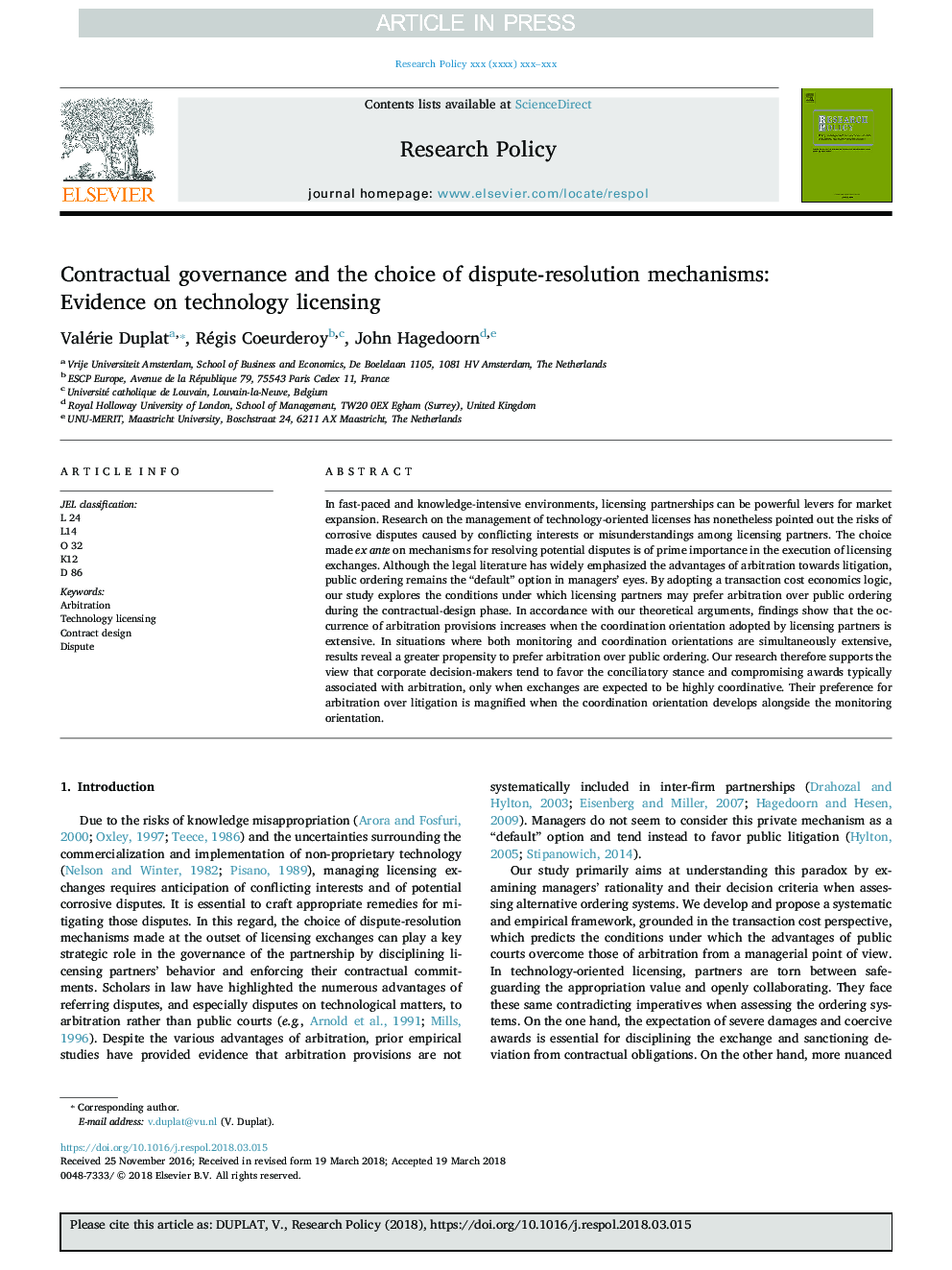| کد مقاله | کد نشریه | سال انتشار | مقاله انگلیسی | نسخه تمام متن |
|---|---|---|---|---|
| 7384379 | 1480584 | 2018 | 15 صفحه PDF | دانلود رایگان |
عنوان انگلیسی مقاله ISI
Contractual governance and the choice of dispute-resolution mechanisms: Evidence on technology licensing
ترجمه فارسی عنوان
حکومتداری قراردادی و انتخاب سازوکارهای حل اختلاف: شواهد بر مجوز فناوری
دانلود مقاله + سفارش ترجمه
دانلود مقاله ISI انگلیسی
رایگان برای ایرانیان
کلمات کلیدی
ترجمه چکیده
در محیط های پر سرعت و دانش فشرده، مشارکت های صدور مجوز می تواند قدرت قوی برای گسترش بازار باشد. با این وجود تحقیقات در زمینه مدیریت مجوز های فناوری گرا ریسک اختلافات خوردگی ناشی از منافع متضاد یا سوء تفاهم بین شرکای صدور مجوز را ذکر کرده اند. انتخابی که در مورد مکانیسم برای حل اختلافات بالقوه پیش بینی شده است، اهمیت زیادی در اجرای مبادلات مجوز دارد. اگر چه ادبیات حقوقی به طور گسترده ای در مورد مزایای داوری به سمت دادرسی مورد تاکید قرار گرفته است، سفارش عمومی به عنوان یک دیوانه باقی مانده است گزینه در چشم مدیران. با اتخاذ یک منطق اقتصادی هزینه معامله، مطالعه ما شرایطی را بررسی می کند که شرکای صدور مجوز می توانند داوری بیش از سفارش عمومی را در مرحله طراحی طراحی قرارداد ترجیح دهند. با توجه به استدلال های نظری ما، یافته ها نشان می دهد که درگیری های مقررات داوری افزایش می یابد زمانی که جهت گیری هماهنگ پذیرفته شده توسط شرکای صدور مجوز گسترده است. در شرایطی که هر دو جهت گیری نظارتی و هماهنگی به طور همزمان گسترده هستند، نتایج نشان می دهد تمایل بیشتر به ترجیح دادن به داوری بیش از سفارش عمومی. بنابراین تحقیق ما از این دیدگاه حمایت می کند که تصمیم گیرندگان شرکت ها تمایل دارند موضع تسلیحاتی و مصالحه با جوایزی را که معمولا به داوری مربوط می شود، ترغیب نمایند، تنها زمانی که مبادلات انتظار می رود بسیار هماهنگ باشند. اولویت آنها برای داوری بیش از دعوی قضایی هنگامی افزایش می یابد که جهت گیری هماهنگی همراه با جهت گیری نظارت ایجاد شود.
موضوعات مرتبط
علوم انسانی و اجتماعی
مدیریت، کسب و کار و حسابداری
کسب و کار و مدیریت بین المللی
چکیده انگلیسی
In fast-paced and knowledge-intensive environments, licensing partnerships can be powerful levers for market expansion. Research on the management of technology-oriented licenses has nonetheless pointed out the risks of corrosive disputes caused by conflicting interests or misunderstandings among licensing partners. The choice made ex ante on mechanisms for resolving potential disputes is of prime importance in the execution of licensing exchanges. Although the legal literature has widely emphasized the advantages of arbitration towards litigation, public ordering remains the “default” option in managers' eyes. By adopting a transaction cost economics logic, our study explores the conditions under which licensing partners may prefer arbitration over public ordering during the contractual-design phase. In accordance with our theoretical arguments, findings show that the occurrence of arbitration provisions increases when the coordination orientation adopted by licensing partners is extensive. In situations where both monitoring and coordination orientations are simultaneously extensive, results reveal a greater propensity to prefer arbitration over public ordering. Our research therefore supports the view that corporate decision-makers tend to favor the conciliatory stance and compromising awards typically associated with arbitration, only when exchanges are expected to be highly coordinative. Their preference for arbitration over litigation is magnified when the coordination orientation develops alongside the monitoring orientation.
ناشر
Database: Elsevier - ScienceDirect (ساینس دایرکت)
Journal: Research Policy - Volume 47, Issue 6, July 2018, Pages 1096-1110
Journal: Research Policy - Volume 47, Issue 6, July 2018, Pages 1096-1110
نویسندگان
Valérie Duplat, Régis Coeurderoy, John Hagedoorn,
